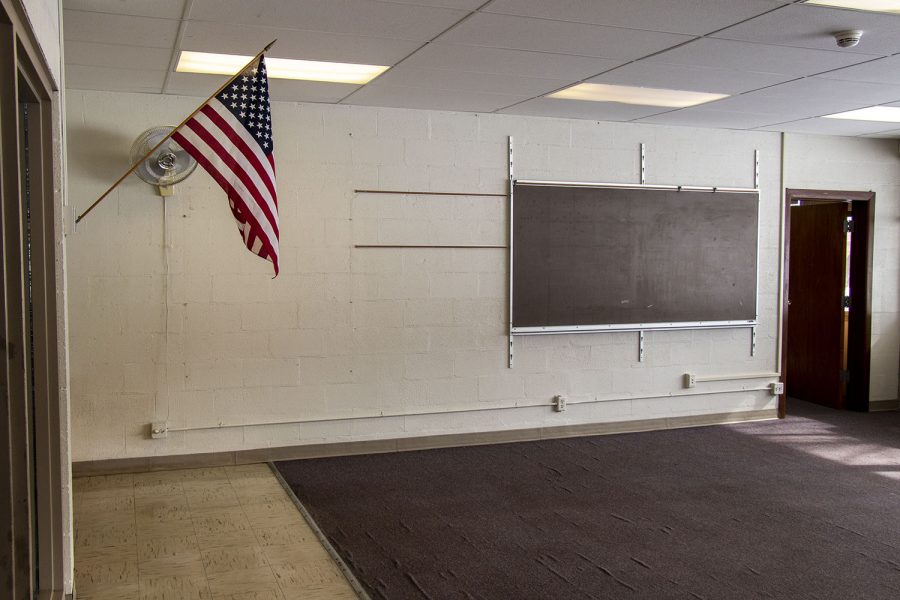Iowa City parents dispute Pledge of Allegiance bill
The Iowa House passed a bill that requires schools across the state to recite the Pledge of Allegiance, and Iowa City parents are questioning the value of this legislation.
The American flag is seen hanging in an abandoned room at Theodore Roosevelt Education Center seen on Monday, Feb. 22, 2021.
March 2, 2021
A bill passed by the Iowa House in February with bipartisan support would require school districts to recite the Pledge of Allegiance daily, causing some Iowa City parents to question the value of this legislation.
Three House Democrats voted against the bill, which has yet to be voted on by the Iowa Senate.
Mike Schluckebier is a parent to two elementary-aged students at Mark Twain Elementary School in the Iowa City Community School District. Following the bill’s approval, he said he wrote to Rep. Christina Bohannon, D-Iowa City, inquiring about her support for the bill.
“She wrote back to me, and one of her reasons [for supporting the bill] is that she said Iowa City schools are already reciting the pledge,” Schluckebier said. “I wasn’t sure if that was actually the case.”
Schluckebier said he posted a thread on an Iowa City Community School District discussion Facebook page. On the post, he said parents discussed whether or not the schools their children attend in the district say the pledge.
“I already knew my kids at [Mark] Twain do not recite the pledge in their classrooms,” he said. “I didn’t get feedback from all the schools and classrooms — but at least from what I can understand and assess — there are quite a few schools in the Iowa City district that are not doing it.”
Iowa City school board President Shawn Eyestone wrote in an email to The Daily Iowan that, at best, the bill is over legislating something that didn’t require attention.
“My understanding of the bill is that it forces the districts and schools to have the pledge, but it doesn’t force students to participate,” Eyestone wrote. “I have read what several state-wide advocacy groups have said on this matter. They are all pretty much in agreement that the majority of elementary schools do it now voluntarily for students. Secondary schools don’t do it as regularly, but secondary students are also less likely to voluntarily recite the pledge.”
Laura Crossett, a parent to an elementary student at Iowa City schools, said this isn’t the first time the Pledge of Allegiance has been a hot topic in the district.
Crossett used to be a student in the Iowa City school district. In 1985, when she was a third grader at Lincoln Elementary School, she said a group of parents became angry the school was not saying the pledge routinely.
“Throughout the school, they halted social studies classes for a week so classes could study the Pledge of Allegiance,” Crossett said. “We watched a documentary about its history, and we looked up and defined words in the pledge that we didn’t know.”
Crossett said after the class spent the week analyzing and debating the pledge, the class voted on whether they should recite it. Her class ended up choosing not to say it unless a special occasion arose, she said.
“It was a very formative experience. It changed my way of thinking about the world, how to understand it, and how if and when I had a kid, I wanted them to understand the world and receive education,” Crossett said. “Simply requiring people to say something doesn’t include any of those things and is therefore not really what we mean when we say education.”
Like Crossett, district parent Marsha Cheyney said she does not think her children will educationally benefit from the bill.
“I think that if we want our kids to grow up to be critical thinkers, we shouldn’t be telling them what to say now,” Cheyney said. “I also think there’s a huge issue with telling children that they live in a place with liberty and justice for all when that may not be their lived experience.”
As an Army veteran, Cheyney said she is confused when she hears people liken students reciting the pledge to reverence for the military.
“There’s a lot of people who are just dead set that this is the patriotic thing people have to do to honor soldier sacrifice. In the army, we did the flag ceremony, but the Pledge of Allegiance wasn’t even part of that,” Cheyney said. “We didn’t sacrifice so that you could tell kids to say the Pledge of Allegiance.”







